
Dr. Robert Finkelman, a geoscience research professor at UT Dallas, recently received the 2022 John Castaño Honorary Membership Award from The Society of Organic Petrology [TSOP] in recognition of his “exemplary commitment to education, excellence in research and service to TSOP.” It is the highest honor the society bestows on individuals working in the fields of organic petrology and geochemistry.
Founded in Houston in 1984, TSOP is a nonprofit organization for scientists and engineers involved with coal petrology, kerogen petrology, organic geochemistry, and related disciplines with more than 200 members in 30 countries.
Dr. Finkelman has been a member of TSOP since 1986 and was the group’s president in 2004.
The award was presented during the society’s annual meeting in September.
Dr. Finkelman joined the School of Natural Sciences and Mathematics in 2005 after retiring from a 32-year career as a senior scientist and project chief with the U.S. Geological Survey in Reston, Virginia.
He is an internationally recognized scientist widely known for his work on coal chemistry, its economic byproducts, and its environmental and health impacts, and as a leader of the emerging field of medical geology.
Dr. Finkelman previously served on the National Research Council committee examining the future of coal in the United States.
“What we [medical geologists] do is look for environmental and geologic conditions that impact or may impact human health. We work with physicians and public health researchers to understand the causes of existing health problems,” Dr. Finkelman said.
Though medical geology may sound like an emerging field, it has been practiced for thousands of years, he said.
“People have been aware of how the environment impacts their health. Some of the oldest writings from civilizations across the globe have recognized the dangers in being exposed to certain waters or rocks.
“These earliest writings have recommended that people eat a certain mud, shale, or water to benefit their health. People didn’t understand why, of course, but they recognized both the danger and the benefits of the natural environment,” Dr. Finkelman said.

About 20 years ago scientists began to try to codify this environmental knowledge, to systematize it and organize it. Not only by conferences and short courses, but developing societies devoted to the idea that the natural environment impacts human and animal health, he said.
“We have yet to come up with a solution for coal’s carbon dioxide emissions. Hopefully some young innovative scientists from UTD will find the answer and the solution to that problem.
“Organic petrology is the study not only of rocks but of naturally occurring organic materials, including oil, gas, tar sands, oil shales. And for many, many years, coal was society’s primary focus. That now has transitioned.
“There still are people working on coal, but not in the United States. Now more people are working on oil and gas, primarily,” he said.
Finkelman typically teaches in the spring semester. The course is titled, “How the Natural Environment Gets Away with Murder.”
“A good part of that course we’re talking about the impacts of coal and coal fires on human health. This is a big issue globally,” Dr. Finkelman said.
Of the award he said, “Well, it’s a recognition of a lifetime of contribution to the society and to the science. I’m certainly honored, thrilled for the recognition. And, as I wrote to them, I’ve said this will stimulate me to even work harder to show them that I do deserve this recognition.
“I appreciate it. Even though I retired 20 years ago, I have no intention of stopping. I feel that the work I’m doing benefits those people who have no advocate, and I will continue hopefully training students at UTD and elsewhere who will carry on this work.
“It gives me a great deal of pleasure to have the sense that the work I’ve done, my education, my experience, will have some benefit to our global society going forward. That’s wonderful. That’s great.”
Dr. Finkelman is the author of more than 900 publications and has been invited to speak in more than 50 countries and he was the first person to have written a dissertation on the returned lunar samples.
Help us leave the planet a better place for future generations. Your support for the School of Natural Sciences and Mathematics funds scientific discoveries with real-world applications, student and faculty recruitment, and academic scholarships.